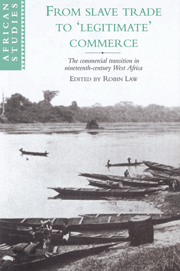 From Slave Trade to 'Legitimate' Commerce
From Slave Trade to 'Legitimate' Commerce Book contents
- Frontmatter
- Contents
- List of contributors
- List of abbreviations
- Introduction
- 1 The initial ‘crisis of adaptation’: the impact of British abolition on the Atlantic slave trade in West Africa, 1808–1820
- 2 The West African palm oil trade in the nineteenth century and the ‘crisis of adaptation’
- 3 The compatibility of the slave and palm oil trades in Dahomey, 1818–1858
- 4 Between abolition and Jihad: the Asante response to the ending of the Atlantic slave trade, 1807–1896
- 5 Plantations and labour in the south-east Gold Coast from the late eighteenth to the mid nineteenth century
- 6 Owners, slaves and the struggle for labour in the commercial transition at Lagos
- 7 Slaves, Igbo women and palm oil in the nineteenth century
- 8 ‘Legitimate’ trade and gender relations in Yorubaland and Dahomey
- 9 In search of a desert-edge perspective: the Sahara-Sahel and the Atlantic trade, c. 1815–1900
- 10 The ‘New International Economic Order’ in the nineteenth century: Britain's first Development Plan for Africa
- Appendix The ‘crisis of adaptation’: a bibliography
- Index
10 - The ‘New International Economic Order’ in the nineteenth century: Britain's first Development Plan for Africa
Published online by Cambridge University Press: 21 September 2009
- Frontmatter
- Contents
- List of contributors
- List of abbreviations
- Introduction
- 1 The initial ‘crisis of adaptation’: the impact of British abolition on the Atlantic slave trade in West Africa, 1808–1820
- 2 The West African palm oil trade in the nineteenth century and the ‘crisis of adaptation’
- 3 The compatibility of the slave and palm oil trades in Dahomey, 1818–1858
- 4 Between abolition and Jihad: the Asante response to the ending of the Atlantic slave trade, 1807–1896
- 5 Plantations and labour in the south-east Gold Coast from the late eighteenth to the mid nineteenth century
- 6 Owners, slaves and the struggle for labour in the commercial transition at Lagos
- 7 Slaves, Igbo women and palm oil in the nineteenth century
- 8 ‘Legitimate’ trade and gender relations in Yorubaland and Dahomey
- 9 In search of a desert-edge perspective: the Sahara-Sahel and the Atlantic trade, c. 1815–1900
- 10 The ‘New International Economic Order’ in the nineteenth century: Britain's first Development Plan for Africa
- Appendix The ‘crisis of adaptation’: a bibliography
- Index
Summary
That the definition of a problem has a strong, even a determining, influence on the solution proposed is a truism acknowledged by historians more often than it is acted upon. This is partly because the empirical tradition encourages scepticism towards ‘abstract’ thought, and partly because historical enquiry inevitably becomes distanced from the pre-suppositions that launch it. This is why the conceptual foundations of substantial historical controversies require periodic inspection, especially if they have been running for a generation or more, as is the case with the debate over the ‘transition’ in nineteenth-century West Africa. At this point, readers learned in the ways of academe may already fear that they are about to be lured into one of the many deep holes that specialists dig to trap their unwary colleagues. Certainly, this debate has produced case studies that can match those generated by other historical problems in their detail and, some might say, in their obscurity too. But the wider issues ought to command wide attention: they go to the heart of the problem of the long-run economic development of Africa; they can also be set in a much broader, international context, one that encompasses European imperialism in the late nineteenth century, as this essay will try to show.
Two main kinds of conceptual reflection suggest themselves.
- Type
- Chapter
- Information
- From Slave Trade to 'Legitimate' CommerceThe Commercial Transition in Nineteenth-Century West Africa, pp. 240 - 264Publisher: Cambridge University PressPrint publication year: 1995
- 9
- Cited by


